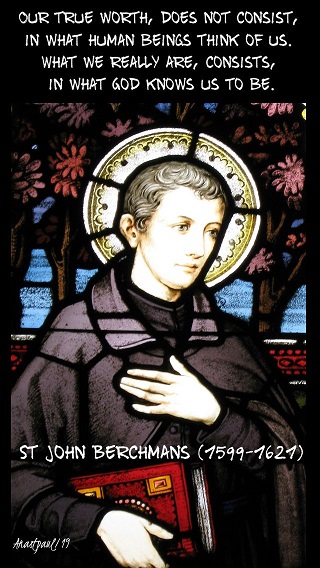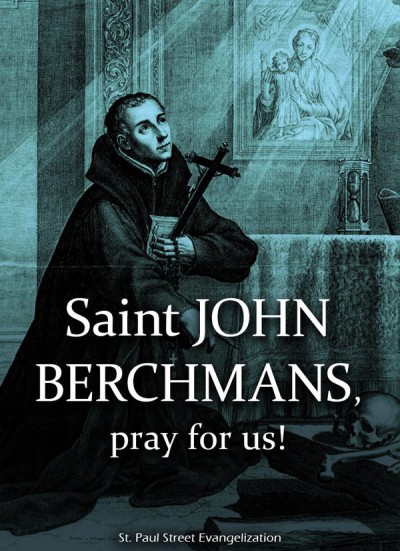Saint John Berchmans, SJ
Born : March 13, 1599
Died : August 13, 1621
Beatified : May 9, 1865
Canonised : January 15, 1888
Feast: 26 November (until 1969)
13 August (after 1969)
 St John Berchmans was born in Diest, Belgium of very pious parents. His father was a shoemaker and three of their five children entered religious life. John studied in the local school and lived in the rectory of Notre Dame parish with other boys interested in the priesthood where he learn to pray and to serve Mass. When his father could no longer afford his education and withdrew him from school, John was very disappointed as he knew that he could never become a priest. T he pastor of the Diest Beguinage offered to take John into his house as a servant and pay for his education in return. Later John served in Canon Froymont’s household in Mechlin, served at tables, ran errands and care for other boarders. It was tough work after a full day in class but John’s desire to become a priest spurred him on.
St John Berchmans was born in Diest, Belgium of very pious parents. His father was a shoemaker and three of their five children entered religious life. John studied in the local school and lived in the rectory of Notre Dame parish with other boys interested in the priesthood where he learn to pray and to serve Mass. When his father could no longer afford his education and withdrew him from school, John was very disappointed as he knew that he could never become a priest. T he pastor of the Diest Beguinage offered to take John into his house as a servant and pay for his education in return. Later John served in Canon Froymont’s household in Mechlin, served at tables, ran errands and care for other boarders. It was tough work after a full day in class but John’s desire to become a priest spurred him on.
In 1615, when the Society opened its college in Mechlin, John transferred there, met the Jesuits and decided to join them rather than the diocesan priesthood. As a novice, he performed all the prescribed duties with joy and exactness. He learned self control and not yield to instinct. Nothing was too small or humiliating for him as everything was the will of God. His mother died in 1616 and his father gave up his shoemaker shop and entered the diocesan seminary and was ordained a priest in 1618. Not only was Alphonsus now without family but his cloth business began to decline due to heavy taxes levied on exporting wool products that he was finally forced to give it up.
 John began his philosophy in Antwerp in 1618 but was sent to study at the Roman college soon after. He was faithful to his religious duties and studies and did so well that when he concluded his philosophy in 1621, he was asked to defend his course in a public disputation. His health suffered during his studies and deteriorated while preparing for the disputation. After the disputation, he was to represent the Roman College at another disputation at the Greek College and the day after this he had his first attack of dysentery followed by fever which persisted. His superior sent him to the infirmary when he became pale and weak but his illness grew worse and feeble when his lungs became inflamed.
John began his philosophy in Antwerp in 1618 but was sent to study at the Roman college soon after. He was faithful to his religious duties and studies and did so well that when he concluded his philosophy in 1621, he was asked to defend his course in a public disputation. His health suffered during his studies and deteriorated while preparing for the disputation. After the disputation, he was to represent the Roman College at another disputation at the Greek College and the day after this he had his first attack of dysentery followed by fever which persisted. His superior sent him to the infirmary when he became pale and weak but his illness grew worse and feeble when his lungs became inflamed.
When it was clear that john was quickly slipping away, the whole Jesuit community came in procession bringing the Last sacrament to its dying brother. After receiving the Lord, John asked to be anointed. Everyone was in tears; John alone was calm, asked for his crucifix, rosary, and rule book and said: “These are the three things most dear to me; with them I willingly die.” The next day he endured a stream of Jesuits and classmates coming to see him for the last time. Fr General also paid him a visit. John spent his last night on earth in prayer. The following morning, August 13, when the Jesuit community heard the tolling of the bell at 8.30, they knew that John was in Paradise.
It was the simplicity of John’s life that made him attractive. His rector wrote: “What we universally admired in him was that in all the virtues he showed himself perfect and that, with the help of divine grace, to which he responded his utmost, he performed all his actions with all the perfection that can be imagined.” The Jesuits in Rome were convinced that John was a saint, and within a year after his death they began gathering data to be used for his beatification. Extraordinary accomplishments are not required for holiness. It was John Berchmans’ ordinary deeds done extraordinarily well that brought him to sanctity.
